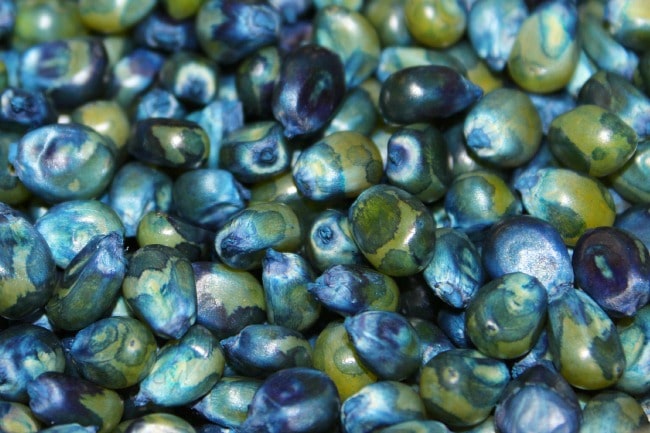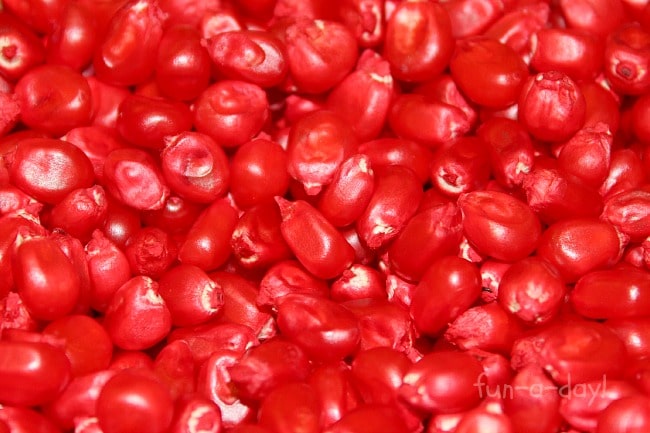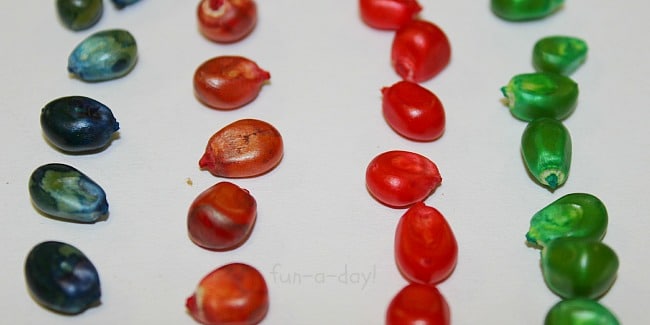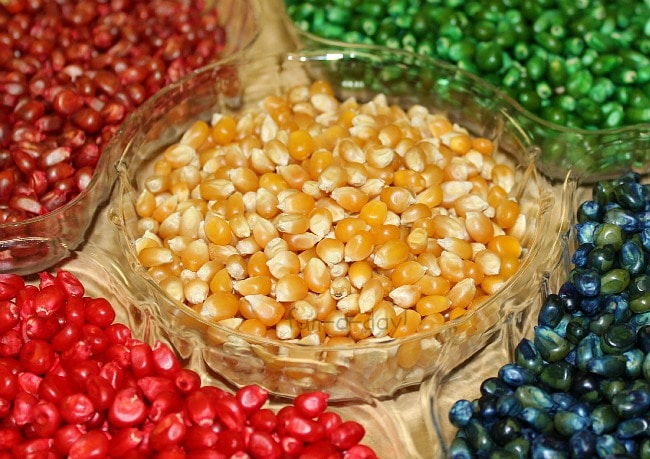I have always loved the look of brightly colored popcorn kernels and finally figured out how to dye corn! They’re perfect in many of my favorite fall activities for kids!
Are you following Fun-A-Day’s Fall Pinterest board?

Now that we have colorful corn kernels, we use them ALL THE TIME. They’re great for sensory exploration, for art projects, as manipulatives during math, and for decorating.
Colorful sensory materials really engage the kids in a wide variety of early learning activities. The visual stimulation seems to draw the children’s interest in, doesn’t it?
I really, really wanted to use some colorful corn in a few preschool activities. I love making my own sensory materials and have great success dyeing rice, pasta, and pumpkin seeds, so I thought learning to dye corn would be easy.
But since I’d never created colored popcorn kernels before, I looked online for some suggestions. While there are tons of ideas for preparing, decorating with, and creating with corn, there weren’t too many ideas about HOW to dye corn kernels.

Related: How to Dye Pumpkin Seeds
How to Make Colored Popcorn Kernels
Me being me, I turned this whole process into my own little science experiment. I’m pretty sure my students all found this process very entertaining! I know my teaching assistant got a few good laughs at it.
Oh, and just to clarify, the corn kernels are just regular ol’ popcorn kernels.
First Up: How NOT to Dye Corn
First, I tried the baggy and food dye method. I placed some corn kernels in a plastic baggy, added some food coloring, zipped the bag, and shook everything up for a few minutes.
Even though this method works great when I dye pasta and rice, it didn’t cut it for the corn!
The corn kernels have a smoother surface than rice or pasta, which is why I think this method didn’t work all that well. The dye stuck to some parts of the kernels but not others, and the color just wasn’t all that great.

Next, I tried adding a little bit of rubbing alcohol to the baggy that held corn and food coloring. Still the same problems. I tried a splash of vinegar too, but to no avail.
As I told the kiddos, when you’re conducting a scientific experiment you need to try more than one idea. This was also a great way to show the children that not all experiments are a success!
Richly Colored Popcorn Kernels
I kept plugging along until I came upon a method that worked incredibly well for me. To finally create a rich, even color on the corn kernels, I dyed them like I would dye Easter eggs!

When comparing the final batch to the original batch, there was a marked difference. The kids and I used all of the corn, even the botched attempts, but I definitely preferred the corn from my final batch!

Materials Needed to Dye Corn Kernels
Here’s what I ended up using in my successful corn dyeing attempts. Most of these items are easily found in the kitchen.
Or, if you’re anything like me, you’ll have them in your preschool teacher stash already.
- A jar, container, or plastic baggie large enough to hold about 2 cups of liquid
- Water
- Vinegar
- Food Coloring
- Popcorn Kernels
- Slotted Spoon
Directions to Dye Corn
Below you’ll find my tried-and-true method for how to dye corn. I’ve made colorful corn this way countless times since 2013. And I’m happy to report that this method has worked successfully every time!
Start off by partially filling a jar, container, or plastic baggie with water. We used about 2/3 cup of water.
Next, add vinegar to the water. I found that having the amount of vinegar equal to the amount of water we used worked the best. So we used about 2/3 cup of vinegar.
You can try using less vinegar if you want, but don’t leave it out entirely. I tested dyeing the corn using my method without the vinegar and it didn’t work out nearly as well.
Then add your desired amount of food coloring to the water/vinegar mixture. Swish to distribute color. I used about a tablespoon of coloring for every cup or two of corn.

Related: Butterfly Life Cycle Sensory Bottles
Finally, it’s time to add the corn kernels to your container. We used about a cup of corn. Make sure the liquid completely covers the corn. If it doesn’t, add a bit more liquid.
Now it’s time to wait. You need to let the corn sit in the liquid for at least a few hours. I let mine sit overnight and find that gives me the best results.
The next morning, remove the corn kernels using a slotted spoon.
Be sure to let the corn dry completely. I know the process takes a bit of time, but it is well worth it!
Have you ever tried to dye corn kernels?
Fun Activities to Try Using Colored Popcorn Kernels
The best part is playing with the corn! My preschool kids can’t get enough of it, and I can’t either, of course.
We make this colorful corn mosaic art every year. It’s always fun to see the children’s individual creations.
Our rainbow corn sensory bin is always a hit! We used it around St. Patrick’s Day the first time, but it really is suitable any time of the year.

In December, the kids love this scented candy cane sensory bin. You can use it around Valentine’s Day too, especially if you leave out the peppermint scent.
And red and green corn kernels are perfect for Christmas contact paper art! It was actually the kids’ idea to incorporate the corn in this art idea.
Where to Buy Colored Popcorn Kernels
Obviously, I love colorful corn for a variety of activities! But I know not everyone has the time or inclination to dye corn themselves. So I thought I’d share some ideas for buying colored popcorn kernels instead.
Keep in mind, the only way to really get richly-colored rainbow corn is to dye it yourself. BUT you can also find a variety of non-yellow corn to purchase.
First, take a look at local grocery stores and chain stores. Keep an eye out for “gourmet” popcorn. You’ll often find multi-color corn kernels that way.
After that, you can check out corn kernels online. Below are some possibilities from Amazon. I haven’t had the chance to try these out, as I tend to prefer making my own!
A Note about Using Foods for Sensory Play and Art
I know that some people are concerned about using food for art/crafts/sensory play/etc. There is a concern that it is disrespectful towards children who might not be getting enough to eat at home.

While I certainly understand this concern, I respectfully disagree. In the past, I have worked with children who weren’t getting enough to eat.
As their teacher, and a member of their community, I did all I could to ensure they were cared for and well-nourished. I would never let a child in my care go hungry, and their needs were (and always are) paramount in my mind.
It is still an issue that I concern myself with now, even though my current students don’t have those same problems. The food I use for crafts, sensory play, etc. are often stale or past their “sell by” dates.
I also take great care to keep the food in sealed containers to use again and again if it’s possible.
If you’d like to read pros and cons on this topic, TinkerLab has a great post about this topic – Should Food Be Used in Preschool Sensory Activities?
More Preschool Learning Ideas
Save time and get right to the playful learning with done-for-you lesson plans and educational activities for preschoolers from Preschool Teacher 101.
Click the images below for more information about each resource. Be sure to take a look at the membership options, too.
Originally published November 25, 2013. Post updated to include new images and video.

The post How to Dye Corn for Richly Colored Popcorn Kernels appeared first on Fun-A-Day!.


